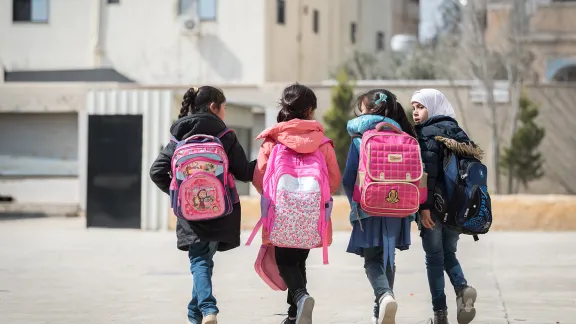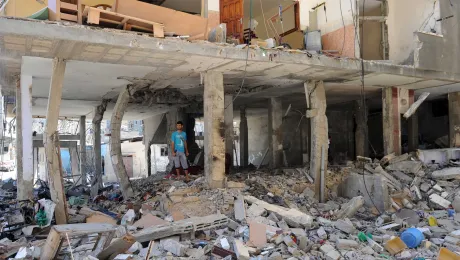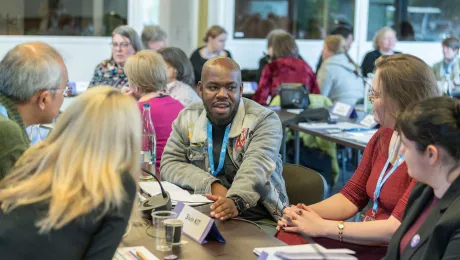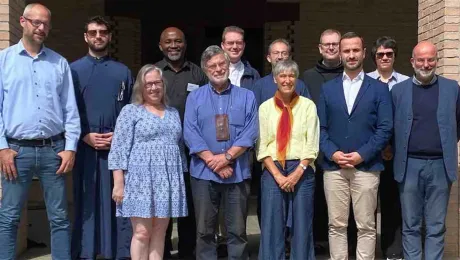
A group of girls head to a school in Jordanâs Sahab district that is supported by LWF for both Jordanian and Syrian children. Photo: LWF/Albin Hillert
LWF endorses commitment to peace through joint statement and Waking the Giant webinar on SDG 16
(LWI) - Celebrating the International Day of Peace on 21 September, the Lutheran World Federation has signed on to a statement highlighting the urgency of peacebuilding for a post-pandemic world. This year, the annual observance inaugurated by the United Nations in 1981, is focusing on the theme ‘Shaping Peace Together’ amid challenges presented by the COVID-19 pandemic.
The statement, entitled ‘The time is now: Re-commit to Peace’ has been co-signed by dozens of human rights, humanitarian and development organizations of all faiths and none. It contains a stark warning that the founding principles of the UN charter of human rights are being forgotten, resulting in “development losses and human suffering” that is “leaving many behind.”
Noting the negative impact that COVID-19 and its economic effects are having on people’s lives, the statement warns that “actions by governments and others are making things worse” by responding with increased “violence, injustice and exclusion that set aside the dignity and worth of the human person and the equal rights of men and women and of nations large and small.”
Free up resources for peacebuilding and participation
The signatories call on the international community to mainstream peacebuilding in the response to COVID-19, to prioritize participation of all sectors of society in decision-making and to reaffirm international human rights legislation “as a safeguard for the most vulnerable.”
The statement also reiterates the call for a global ceasefire, issued by the UN Security Council and endorsed by LWF General Secretary Rev. Dr Martin Junge in July, as well as urging countries to eliminate nuclear weapons and cut military spending to free up critical resources.
Rev. Dr Sivin Kit, LWF's program executive for Public Theology and Interreligious Relations said: “The sustained contribution of faith actors, nationally and locally, is critical for preventing conflict, intervening at critical moments, and post-conflict rebuilding of social harmony.” He continued: “In our work with ecumenical, interfaith, and other partners, we are committed to link grassroots, practical initiatives with global processes in fulfilling our call as peacemakers.”
SDG 16: Peace, Justice, Strong Institutions
Peacebuilding was also the focus of a recent LWF webinar bringing together members of the Waking the Giant initiative, which works to build the capacity of churches to contribute effectively to the UN’s Sustainable Development Goals (SDGs). Focusing on SDG 16 regarding Peace, Justice and Strong Institutions, the online discussion featured practical examples of what churches are doing in Colombia and the United States to promote dialogue, inclusion and reconciliation as key components of a peaceful society.
Bishop Eduardo Martìnez Diaz, national coordinator of Waking the Giant’s Colombia program, explained how his church is working closely together with many other faith-based organizations through a ‘Faith and Development’ platform and with the civil society peace movement known as ‘Dipaz’. He cited a recent Dipaz initiative calling on the UN Security Council to renew the mandate of a Verification Mission which is monitoring the government’s compliance with the 2016 peace agreement in Colombia.
Sara Lara, coordinator of the human rights program of the Evangelical Lutheran Church of Colombia (IELCO) stressed that the peacebuilding mission of churches in her country has been honed over decades of conflict, during which “we did this work to survive and sustain hope in our communities.” This role is “increasingly recognized by the government,” she added, but the LWF’s “global network of churches has an important ability to support our work.”
At a time of rising populism and nationalist policies and discourse, we all have a role to play in promoting the language of peace.
Alaide Vilchis Ibarra, Program Director for Migration Policy with the Evangelical Lutheran Church in America (ELCA) spoke about her work with the AMMPARO strategy to Accompany Migrant Minors with Protection, Advocacy, Representation and Opportunities. She noted the “prophetic leadership” of her church in becoming the first 'sanctuary denomination,’ pledging to walk alongside all immigrants and refugees.
Speaking of the Old and New Testament values which unpin the work for justice and reconciliation, Rev. Kit said: “Working for peace is hard work and the lives of human rights defenders are often threatened.” He also underlined “the crucial importance of interfaith and intercultural perspectives to avoid seeing peace through a too narrow lens.” “At a time of rising populism and nationalist policies and discourse,” he said, “we all have a role to play in promoting the language of peace.”
Peacebuilding and public theology will also be at the heart of a webinar led by Rev. Kit on 22 September entitled ‘Ignore, Resist or Engage? Global Responses to Religious Nationalism’. Find full details and registration here.


